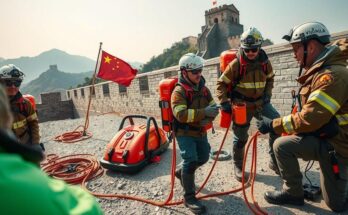Former Philippine President Rodrigo Duterte was arrested in Manila and is being sent to The Hague to face ICC charges for crimes against humanity linked to his anti-drug operations. The arrest has sparked varied reactions among supporters and victims’ families, highlighting legal and ethical debates surrounding human rights accountability in the Philippines.
Former President Rodrigo Duterte of the Philippines has been arrested and is being flown to The Hague to face charges of crimes against humanity. This action comes after the International Criminal Court (ICC) issued an arrest warrant due to his involvement in deadly anti-drug operations during his presidency. Duterte was detained at Manila International Airport upon his return from Hong Kong, a move described by the current President Ferdinand Marcos as legal and necessary under Interpol protocols.
During his arrest, a visibly upset Duterte questioned the legal justification for his detention, demanding answers from authorities. His daughter, Vice President Sara Duterte, attempted to intervene but was denied access, criticizing the Marcos administration for yielding to the jurisdiction of a foreign court. Notably, this arrest marks Duterte as the first former leader from Southeast Asia to be apprehended by the ICC.
The ICC claims there are substantial grounds to believe that these anti-drug operations involved systematic and widespread killings, estimating that fatalities may range from 6,000 per police reports to 30,000 according to human rights advocates. The arrest warrant specifically cites crimes between 2011 and 2019, indicating the need for Duterte’s presence before the court to prevent potential interference in ongoing investigations.
Duterte’s arrest has provoked strong reactions among victims’ families, with some expressing jubilation at what they perceive as a step toward justice. Human rights activist Randy delos Santos celebrated the event, viewing it as a long-awaited triumph, while other advocates call for broader accountability for those involved in Duterte’s anti-drug campaign.
Despite Duterte’s previous withdrawal from the Rome Statute, thereby attempting to escape accountability, the ICC’s investigation initiated in 2011 has since resumed. President Ferdinand Marcos Jr. has chosen not to reinstate the Philippines in the ICC but has indicated a willingness to cooperate with its requests. The ICC’s mandate allows it to intervene when national jurisdictions are ineffective in prosecuting serious crimes such as genocide and crimes against humanity.
In summary, the arrest of former President Rodrigo Duterte marks a significant moment in the Philippines’ legal landscape, as he becomes the first ex-leader charged with crimes against humanity by the ICC. This incident not only underscores the gravity of his anti-drug campaign’s human rights violations but also reflects ongoing debates about national sovereignty, jurisdiction, and accountability. Family members of victims and human rights advocates view this arrest as a critical step toward justice amidst a complex political backdrop.
Original Source: baytobaynews.com




